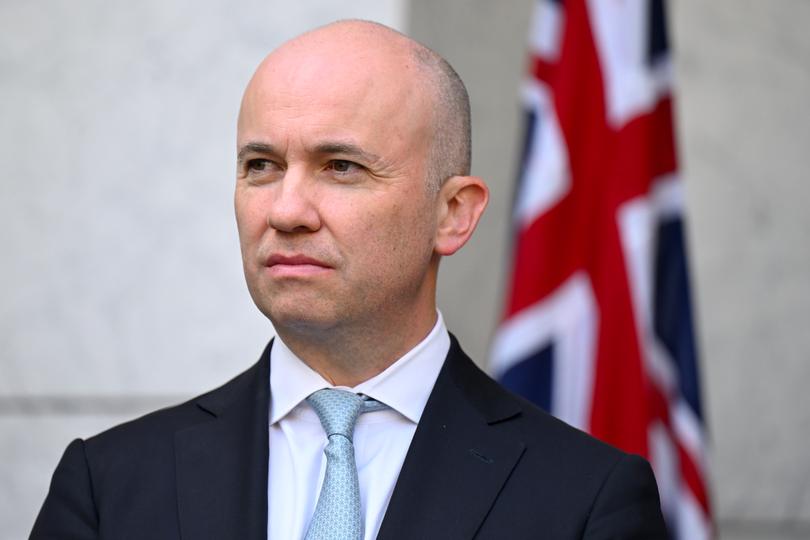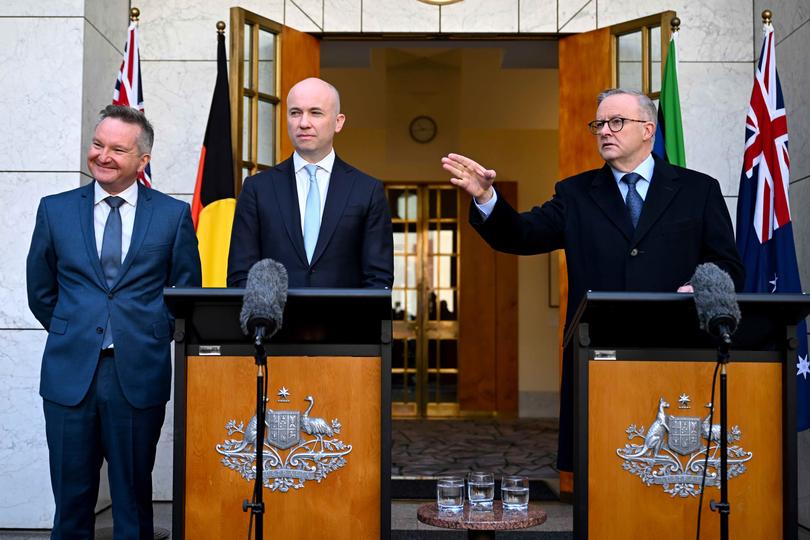Newly appointed Climate Change Authority head Matt Kean changes his tune on nuclear energy
Matt Kean will be tasked with advising the government on how to get Australia to net zero by 2050, but his own words on nuclear could come back to bite Labor.

Matt Kean, who will take over as head of the Climate Change Authority later this year, has poured cold water on the Coalition’s nuclear power plans, despite a history of supporting small modular reactors.
As the federal government prepares for an election to be fought on getting Australia to net zero, the former Liberal energy minister and treasurer — who resigned from state politics just last week — was on Monday appointed the advisory body’s next chief.
One of the most prolific Liberal climate campaigners, Mr Kean will be tasked with providing the government with independent advice on how to ensure Australia gets to net zero by 2050.
Sign up to The Nightly's newsletters.
Get the first look at the digital newspaper, curated daily stories and breaking headlines delivered to your inbox.
By continuing you agree to our Terms and Privacy Policy.His appointment comes just days after Opposition leader Peter Dutton released the first details of his plan to build seven nuclear reactors across the country by 2050, including two small modular reactors.
As Prime Minister Anthony Albanese took aim at the lack of detail in the Coalition’s policy, which he labelled “expensive” and “on the fringe”, Mr Kean promised to be “pragmatic” in his new role.
But, he implied nuclear energy would not be the right course for the country.
His tune has changed since a newly-resurfaced 2021 interview, during which the then-state energy minister indicated support for smaller nuclear reactors.
At the time, a SMR prototype was being developed, and Mr Kean said when that became commercially available in the mid-2030s it could add to the state’s energy mix.
“Right now at this stage, the best way to transition away from our coal-fired power stations is with technology we know works — a combination of wind, solar, batteries, gas, and pumped hydro,” he told Sky News in June 2021.
“Into the future will nuclear have a role to play? I think so and I hope so.”
He said at the time large-scale nuclear reactors posed an economic risk, a sentiment he reinforced on Monday when asked what his approach to the energy form would be in his new role.

Mr Kean said in his experience in deciding whether or not to consider nuclear for the state, he ultimately found it would have “bankrupted” NSW.
“I can only talk about the role that I saw it play as the NSW energy minister in 2019 … I was told the first day on the job that in the next decade … coal-fired power stations would come to an end and we needed a mechanism to replace that capacity. We looked at all options, including nuclear,” he said.
“The advice that I received at the time, which was most compelling, was from the chief scientist of NSW, professor Hugh Durrant-Whyte, and he is one of the few people in the country who has run a nuclear program … His advice to me was to bring nuclear into the system, it would take far too long and would be far too expensive for NSW.”
Mr Kean said the latest advice from the CSIRO pointed to renewables as the “cheapest way” to transition the electricity system.
Mr Dutton has indicated a willingness to back away from the renewables rollout and is prepared to scrap the legislated 2030 emissions target, if he wins the next election.
In announcing the appointment, Prime Minister Anthony Albanese said Mr Kean was uniquely qualified for the job because he both understands the “opportunity that the transition to clean energy represents to our nation”, and the “folly” that would come from walking away from that.
Mr Albanese took aim at Mr Dutton when he said Mr Kean also understands the “folly that walking away from the renewables transition represents”.
Mr Dutton, who last week announced the first details of his plan to transition Australia away from renewables and towards nuclear power, has also indicated his plan to scrap the country’s legislated 2030 target.

As new polling shows voters are split on nuclear power but strongly support renewables, Energy Minister Chris Bowen said Mr Kean would “bring people from across the political spectrum with him for the good of the community” and would help Australia navigate the “critical decade” ahead of it.
“The role that he has played as energy minister of the most populous state in the country, knowing that the opportunities to seize renewables puts downward pressures on bills and reduces emissions, creates jobs and many thousands across New South Wales but of course across the country,” he said.
In announcing the first details of his nuclear plan last week, Mr Dutton said he was happy for the next election to be a “referendum” on energy policy.
The challenge has been met by Labor, with Mr Bowen on Monday saying he was “happy to debate” the topic “every single day between now and the next election”, but demanded Mr Dutton come clean on the full details of the plan, including costings.
“If Mr Dutton is really pleased and proud of this, where are the costs? Where are the gigawatts? Where is what it will mean for renewable energy?” Mr Bowen queried.
One of the big jobs Mr Kean will have once he begins the job in August is advising the government on its 2035 target, which it is required to set next year under the Paris agreement.
Mr Kean said he would “take the time to listen to the evidence and assess the advice” before handing his advice to the government by October.
“I will be making decisions and providing advice to the government based on facts,” Mr Kean said.
Mr Albanese again refused to be drawn on whether or not the 2035 target could be as high as 60 per cent — in line with some preliminary consultation — saying his focus was on delivering the 2030 target.
“The 2035 target is something for down the track,” Mr Albanese said.

